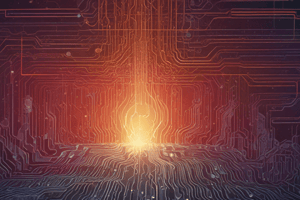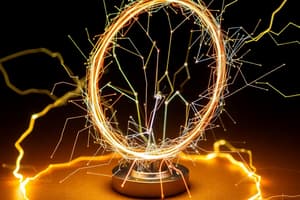Podcast
Questions and Answers
How is voltage related to current and resistance according to Ohm's Law?
How is voltage related to current and resistance according to Ohm's Law?
- $V = I \times R$ (correct)
- $V = \frac{I}{R}$
- $V = I + R$
- $V = I - R$
What is a conductor?
What is a conductor?
- A material that does not allow electric current to flow through it
- A component used to regulate electric current flow
- A material that changes the direction of electric current
- A material that allows the flow of electric current with minimal resistance (correct)
Which of the following is an insulator?
Which of the following is an insulator?
- Glass (correct)
- Gold
- Silver
- Copper
What is the focus of electromagnetism?
What is the focus of electromagnetism?
What does the principle state about a changing magnetic field and an electric field?
What does the principle state about a changing magnetic field and an electric field?
What is the equation for electric power?
What is the equation for electric power?
How is electric power often converted in an electric circuit?
How is electric power often converted in an electric circuit?
What are smart grids in the context of electricity?
What are smart grids in the context of electricity?
What is energy efficiency in the context of electricity and current?
What is energy efficiency in the context of electricity and current?
Why are renewable energy sources considered important?
Why are renewable energy sources considered important?
What are the properties of salts?
What are the properties of salts?
What is the pH of a strongly basic solution?
What is the pH of a strongly basic solution?
What indicates an acidic solution on the pH scale?
What indicates an acidic solution on the pH scale?
Which ions determine the acidity or alkalinity of a solution?
Which ions determine the acidity or alkalinity of a solution?
What are the common properties of bases?
What are the common properties of bases?
What does a neutralization reaction between an acid and a base form?
What does a neutralization reaction between an acid and a base form?
Which of the following is NOT a common base?
Which of the following is NOT a common base?
What is essential to understanding a wide range of chemical problems?
What is essential to understanding a wide range of chemical problems?
Flashcards are hidden until you start studying
Study Notes
Electricity and Current: A Comprehensive Overview
In the realm of physics and engineering, electricity and current play vital roles in powering our world. This article delves into the intricacies of electric circuits, conductors and insulators, Ohm's law, electromagnetism, and electric power.
Electric Circuits
An electric circuit is a path that allows electric current to flow from a power source through various components, such as resistors, capacitors, and inductors. These components interact to regulate and manipulate the flow of electric current.
Conductors and Insulators
A conductor is a material that allows the flow of electric current with minimal resistance. Common conductors include copper, silver, and gold. In contrast, an insulator is a material that does not allow electric current to flow through it, which means that it resists electric current. Common insulators include glass, rubber, and ceramics.
Ohm's Law
Ohm's Law is a fundamental principle in the study of electricity. It relates the voltage (V) and current (I) in a circuit through the resistance (R) of the circuit. The equation for Ohm's Law is:
V = I × R
Where V is the voltage, I is the current, and R is the resistance.
Electromagnetism
Electromagnetism is the field of physics that deals with the interactions between electric charges and magnetic fields. The most notable feature of electromagnetism is the principle of magnetoelectric induction. This principle states that a changing magnetic field induces an electric field, and a changing electric field induces a magnetic field.
Electric Power
Electric power (P) is a measure of the rate at which energy is transferred in the form of electric current through a circuit. The equation for electric power is:
P = I × V
Where P is the electric power, I is the current, and V is the voltage.
Power Conversion
In an electric circuit, power is often converted from one form to another. For instance, electric power is converted to mechanical power using devices like motors, or it is converted to other forms of energy using devices like transformers and resistors.
Energy Efficiency
Energy efficiency is an important concept in the field of electricity and current. It is the ratio of useful output to total input energy. High-efficiency devices waste less energy and are more environmentally friendly than low-efficiency devices.
Smart Grids and Renewable Energy
With the growing concerns about climate change and the need for sustainable energy sources, smart grids and renewable energy are becoming increasingly important. Smart grids are electronic communication networks that monitor and control the flow of electric power from sources to consumers. Renewable energy sources, such as solar, wind, and hydroelectric power, offer a cleaner alternative to traditional energy sources.
In conclusion, electricity and current are fundamental concepts in the realm of physics and engineering. A thorough understanding of these concepts is necessary for the design and operation of efficient, sustainable, and environmentally friendly electric circuits.
Studying That Suits You
Use AI to generate personalized quizzes and flashcards to suit your learning preferences.




